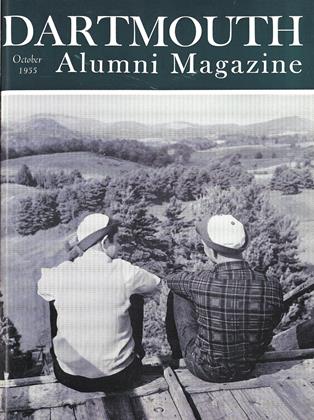By FosterErwin Guyer '06. New York: S. F. Vanni,1955. 238 pp.
Professor Guyer aims in The Titan, I believe, to show the reader unfamiliar with Hugo's genius and unable to read French how great a man and writer Hugo was. Though Professor Guyer sketchily summarizes the life for the chronological framework of his book, it is not a biography; it attempts no description of personality except as this appears in writing. But the picture of Hugo as mind and social force emerges, so that the reader at the end of the book understands the grief of the French nation when Hugo dies in 1885, and the enthusiasm felt for Hugo even by admirers insensitive to his literary attainments. Yet the literary attainments are always foremost in Professor Guyer's treatment of him; he lived to write, it seems, to be a voice, to stand most clearly and forthrightly for a way of communication and a way of viewing life and nature, the Romantic way.
For Professor Guyer the centre of that way is the search for and the use of antithesis and contrast, and in the novels and dramas peripety, the reversal of fortune. At least, in Hugo these seem to be central. Though the novels and dramas are described at some length, and the point is easily made concerning them, the main object of Professor Guyer's interest and the test of his labors and his theory lie in what he does with the poetry. The attentive reader will come away from Professor Guyer's book at least prepared to understand the old crack: "Who is France's greatest poet?" "Still Victor Hugo, alas!"
Professor Guyer devotes himself from the very first page of the book to showing as well as he can in translation the greatness of Hugo as a poet. In his discussion of the dramas, even, he gives much more space to the plays in verse, as Hernani and Ruy Bias, than to those in prose. And many more pages are devoted to the poetry than to work in other forms. In the discussion of the poetry the theme of Hugo's use of antithesis continues to be stressed. Professor Guyer proves that Hugo's mind was especially attracted by that device and that he makes varied and skilful use of it.
To venture to translate as much poetry as Professor Guyer has in this book is daring in these days when the untranslatability of poetry is regarded as an axiom. But Professor Guyer dares, I think successfully. His quality as translator can perhaps be illustrated:
"Répondez, vallon pur, répondez, solitude, O nature abritée en ce désert si beau, Lorsque nous dormirons tous deux dans I'attitude Que donne aux morts pensifs la forme du tombeau;
"Est-ce que vous serez à ce point insensible De nous savoir couches, morts avec nos amours, Et de continuer votre fete paisible, Et de toujours sourire et de chanter toujours?"
"Tell me, pure valley, and answer me, solitude, Oh nature sheltered in this calm and beautiful spot, When we shall sleep, extended at full length As the still dead lie in the narrow tomb, "Will you be so merciless and indifferent, When you know that we are dead, and dead our love, As to celebrate your peaceful fete And still smile the same, sing the same songs?"
 View Full Issue
View Full Issue
More From This Issue
-
 Feature
FeatureFrom Flying Wedge to "T"
October 1955 By CLIFFORD L. JORDAN '45, SPORTS EDITOR -
 Feature
Feature"Not So, Brothers and Friends"
October 1955 By JOHN FINCH, PROFESSOR OF ENGLISH -
 Feature
FeatureAn All-Time Dartmouth Team
October 1955 By LAURENCE H. BANKART '10 -
 Feature
Feature'59 GETS STARTED
October 1955 -
 Class Notes
Class Notes1918
October 1955 By ERNEST H. EARLEY, W. CURTIS GLOVFR, RICHARD P. WHITE -
 Class Notes
Class Notes1926
October 1955 By HERBERT H. HARWOOD, H. DONALD NORSTRAND, RICHARD M. NICHOLS
BENFIELD PRESSEY
-
 Letters to the Editor
Letters to the EditorLetters to the Editor
March 1981 -
 Books
BooksA BIBLIOGRAPHY OF THE WORKS OF EUGENE O'NEILL.
NOVEMBER 1931 By Benfield Pressey -
 Article
ArticleMusic In the Center
February 1940 By Benfield Pressey -
 Books
BooksTHREE SOUTHWEST PLAYS, including WHERE THE DEAR ANTELOPE PLAY,
April 1942 By Benfield Pressey -
 Books
BooksTHESE WERE ACTORS.
January 1956 By BENFIELD PRESSEY -
 Feature
FeatureFive Wishes for America
By BENFIELD PRESSEY
Books
-
 Books
BooksFaculty Articles
April 1946 -
 Books
BooksREQUIEM NEOYORQUINO Y OTROS POEM AS.
December 1957 By ELIAS L. RIVERS -
 Books
BooksAIRPLANES AND HOW THEY FLY,
February 1944 By Herbert F. West '22. -
 Books
BooksMARKETING MANAGEMENT.
January 1962 By Louis P. BUCKLIN '50 -
 Books
BooksTHE MAD DOCTOR'S DRIVE.
DECEMBER 1964 By R.J.B. -
 Books
BooksQUEST FOR MYTH
December 1949 By Vernon Hall Jr.


